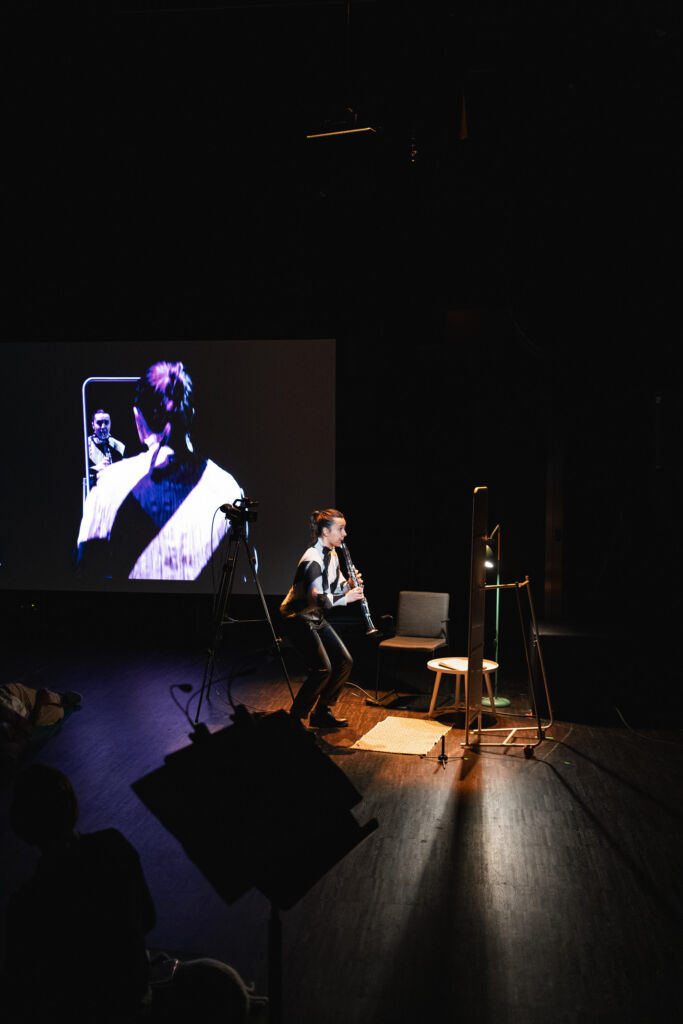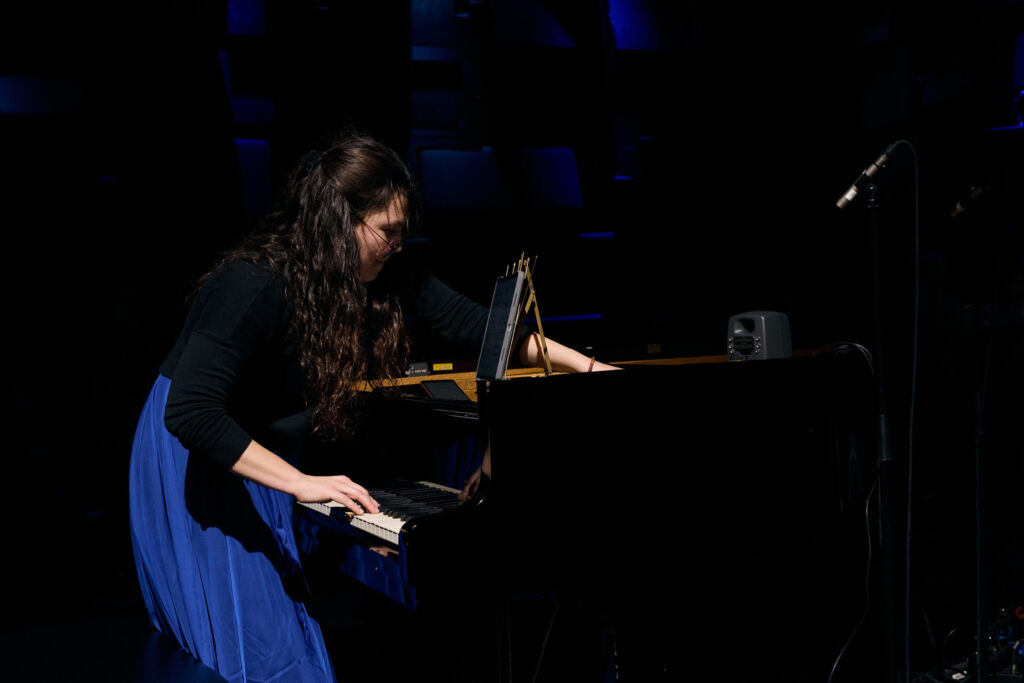On 20 February, the Future Art Lab’s Sound Theatre hosted the final round of the Sounding Visions Award. Six exceptional artists and ensembles presented their performances to a live audience both in the hall and online. This performance-centred competition, organised by the International Society for Contemporary Music (ISCM) in cooperation with the mdw’s Music in Dialogue team and the Department of Music Education Research and Practice, was open to students and graduates of Austrian universities of music.
In keeping with its motto of “How does your vision sound?” this competition set out in search of new concert formats focused on 20th- and 21st-century music. Special emphasis was placed upon the question of how music can be presented in an innovative way—be it through interdisciplinary approaches, new spatial settings, or audience involvement. To this end, initiators Sonja Leipold (ISCM, mdw) and Axel Petri-Preis (mdw) accorded special priority to programming that reflects upon gender and diversity and/or serves to raise the visibility of women composers. The large pool of submissions and the outstanding quality of the projects that were ultimately presented affirmed this competition’s great relevance.
The jury consisted of renowned musicians, concert organisers, and representatives of both the ISCM and the mdw. Its members included the mdw music mediation and community music professor Axel Petri-Preis, the harpsichordist, ISCM Austria president, and mdw teaching faculty member Sonja Leipold, the cellist and 2025/26 ECHO Rising Star Valerie Fritz, the concert creator, stage director, and Nuremberg University of Music professor Anselm Dalferth, and the oboist, dramaturge, author, and mediator Hannah Baumann.

The performances’ high artistic quality and creative ideas thoroughly enthused those who experienced them. The jury, for its part, placed special emphasis on the artistic concepts’ inherent variety and originality as well as the performances’ professional realisation. The winners were selected with an eye to the creativity with which the competition criteria were implemented, artistic excellence, and the innovativeness of their approaches to working in new concert formats.
Of the many impressive contributions, two were awarded first prizes while four received honourable mentions. The first prizes were won by Elena Arbonies Jauregui for FACE(s) and Alba Llorach Roca for Das Verschwinden der Rituale [The Disappearance of Rituals]. The honourable mentions went to Ingvill Statle Skjørten (mezzo-soprano) for Von Spiegeln und Rätseln [Of Mirrors and Riddles], Anna Grenzner (cello) for A body to the world, Anna Maly & Christine Rainer for Weib, Weiblich [Woman, Feminine], and the ensemble COFIE for To paint a vision.
Elena Arbonies Jauregui is a clarinettist and bass clarinettist specialised in contemporary music. She completed the Performance Practice in Contemporary Music master’s degree programme at the University of Music and Performing Arts Graz (which included performances together with Klangforum Wien) and also studied clarinet in Rotterdam and San Sebastián. She is currently studying for a master’s degree in Contemporary Arts Practice (study profile: Music Mediation/Community Music) at the mdw. Her programme FACE(s) explored the metaphorical significance of the term “face” and transformed the space into a multi-layered and immersive musical experience by way of an approach that combined performance art, movement, visuals, and live electronics. This captivating performance gave rise to an intense atmosphere and put the audience in a contemplative state of mind.

Alba Llorach Roca, a versatile artist active as a pianist and violinist, is also a literary and linguistic scholar. She studied piano and literature in Barcelona and completed master’s degrees in both piano performance and contemporary music at Mozarteum University Salzburg as well as a master’s degree in linguistics at the University of Salzburg. Her performance Das Verschwinden der Rituale melded music, dance, and the human voice to create a moving experience that questioned the meaning of rituals in present-day society. Particularly impressive here was how the audience and the performer interacted to generate a dynamic web of sound, motion, and ritual.
The 2025 Sounding Visions Award showed impressively just how diverse and innovative approaches to presenting contemporary music can be, also underlining the importance of such formats in the promotion of creative young artists and innovative concert concepts. Moreover, this competition makes a valuable contribution to opening up the classical concert business to new ideas and perspectives—with this year’s edition having left all who experienced it in eager anticipation of the one to follow.
